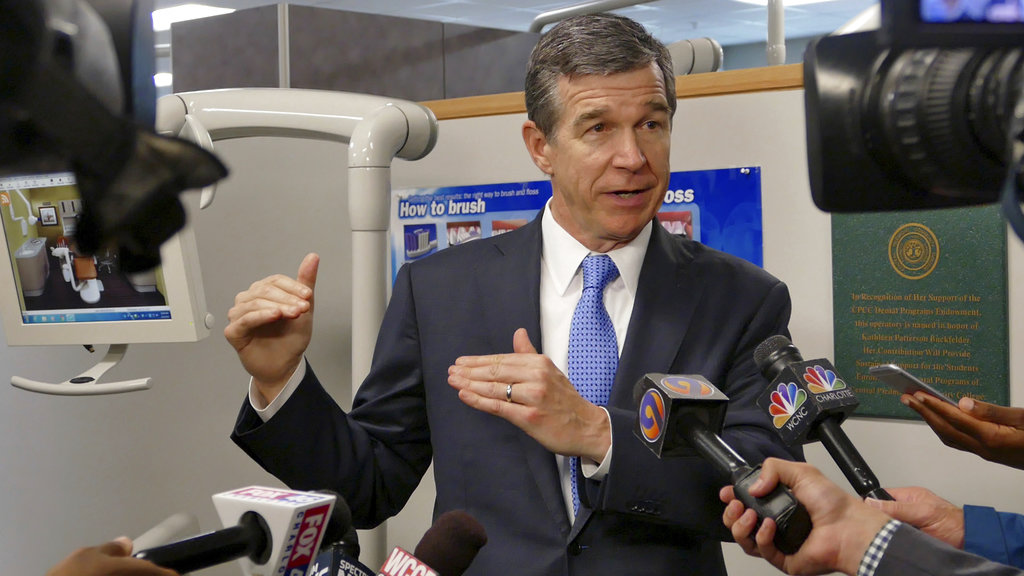Colin Campbell: To change the legislature, look to rural counties
Published 3:19 pm Tuesday, July 25, 2017

- Gov. Roy Cooper AP photo
RALEIGH — When Gov. Roy Cooper recently rolled out his new initiative to “Break The Majority” in the Republican-controlled legislature, his first interview wasn’t with a North Carolina news outlet.
It was with POLITICO — the Washington-based magazine that’s a must-read for D.C. insiders. “Can Roy Cooper show Democrats how to win again?” the bold headline read.
Cooper told the magazine he’s already raised $1 million with the N.C. Democratic Party to flip enough state House or Senate in 2018 to end the GOP’s veto-proof majority. For the second half of his term, Cooper wants the power to veto controversial bills without the legislature overriding him — something that’s happened repeatedly this year.
Cooper likely broke the news in POLITICO to win over national Democratic Party leaders to his cause. Breaking the supermajority will cost a lot more than $1 million, and D.C. Democrats have shown little interest in state legislative races in the past, instead focusing their dollars on races for Congress and governor. That approach has hurt the party because state legislatures draw Congressional maps, and Republicans now control the majority of statehouses. Cooper and the Democrats want to change that before the next round of redistricting in 2021.
While Washington cash will come in handy for N.C. Democrats next year, I can’t help wondering if Cooper shouldn’t have launched the “Break the Majority” campaign in a small-town newspaper instead.
To win back the legislature, Democrats will have to convince voters in rural counties that their party has the best plan to fix economically struggling communities far from Raleigh and Charlotte.
Voters in those counties have been replacing moderate Democrats with Republican lawmakers, and several once-blue counties went red for Donald Trump last year. Today’s Democratic caucus in the legislature is more liberal and more urban than the party that controlled the General Assembly a decade ago.
“Democrats need to reach out more to working class people” who feel like the system has failed them, said Rep. Ken Goodman, a Richmond County Democrat who’s among the few rural moderates remaining in office. “They aren’t wealthy. They don’t get the tax breaks. And they just think the Democratic Party has abandoned them.”
It can be a challenge for N.C. Democrats to come up with a message that resonates equally well in Rockingham as it does in Raleigh. The outcry over House Bill 2 helped drive enthusiasm for Cooper last year in urban areas, but Goodman cautions against running campaigns on social issues in more conservative, religious rural communities.
Likewise, a plan to expand broadband internet access in underserved areas won’t help urban voters who already have fast connections.
But in 2018, neither party has to run a single statewide campaign, so state legislative campaigns can and should be tailored to each district.
With court-ordered redistricting making it uncertain which legislative districts will be competitive in the next election, both parties will need a long list of potential candidates who’d be a good fit for their counties if the state party sees a potential battleground district on the new maps.
The urban-rural tension comes into play here too. For the past several cycles, Democrats have spent heavily in GOP-held urban districts while failing to invest enough in off-the-radar rural races. That happened last year Democratic incumbent Jane Smith lost her re-election bid in Robeson County, a race that didn’t garner much attention. Republicans have improved their organization in many rural counties and brought strong candidates to districts like Smith’s.
Focusing too heavily on urban races can drain a party’s bank account, as TV ads in large markets are expensive. “You can run a campaign in my district for a whole lot less money than you can in an urban district,” Goodman pointed out.
The “Break the Majority” project is a feasible goal for Democrats, but it won’t be an easy one as N.C. Republicans remain strong, and they’re still in charge of drawing districts. The fact that the effort’s top two leaders, Cooper and state party chairman Wayne Goodwin, both grew up in small towns can be a big help — provided they spend a lot of time there between now and the next election.
Colin Campbell is editor of the Insider State Government News Service. Follow him at NCInsider.com or @RaleighReporter. Write to him at ccampbell@ncinsider.com.

